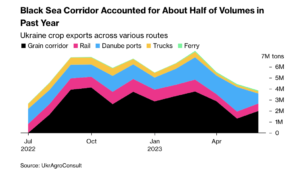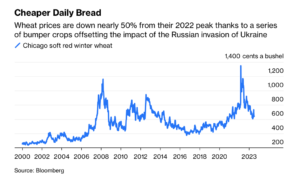A prolonged military conflict in the Middle East could potentially upend key commodity markets due to Iran’s control of the Strait of Hormuz, one of the world’s most important trade…
Amid Black Sea Turmoil, Wheat Set for 9% Weekly Climb; as India Rice Export Issues Emerge
Bloomberg writers Jasmine Ng, Megan Durisin, and Aliaksandr Kudrytski reported today that, “Wheat edged lower but is still poised for a weekly gain of more than 9%, as military drills in the Black Sea add to the risks disrupting grain trade from a vital producing region.
“Russia’s navy on Friday said it conducted a live fire exercise in the waters. That comes at the end of a volatile week that saw the Kremlin terminate a deal allowing Ukraine to export grain via some Black Sea ports, and then attack the nation’s agricultural facilities. Both countries have warned that ships headed to each other’s ports could be considered military targets.
“Russian missiles hit a grain depot in the Odesa region overnight, causing a fire and damaging farm equipment, its regional administration said on Facebook.”
Reuters News reported today that, “Russian missiles hit grain terminals at an agricultural enterprise in the Odesa region in a fourth successive night of air strikes on southern Ukraine, the regional governor said on Friday.
“But Russia’s attacks appeared less intense than on the three previous nights, when missiles and drones struck southern cities and ports after Moscow quit a U.N.-brokered deal allowing safe shipments of Ukrainian grain through the Black Sea.”
Yesterday, New York Times writer Jenny Gross reported that, “The suspension of the deal between Russia and Ukraine also has implications for maritime insurers and shipowners, who will no longer have insurance coverage to travel to Ukrainian ports, said James Whitlam, a product director at Concirrus, a marine data and analytics platform. While the deal between Russia and Ukraine was in effect, ships were able to secure insurance coverage under a temporary agreement.
“‘Insurance markets are now scrambling around trying to understand what exposure they have,’ Mr. Whitlam said.”
And Michael D. Shear, Neil MacFarquhar and James C. McKinley Jr. reported in today’s New York Times that, “In Washington, a White House official accused Moscow at a news conference of engaging in a false-flag operation to implicate Ukraine if Russia attacked a ship. The waters where Russia is said to have placed the mines are in an area already mined by Ukraine to deter an amphibious assault.
“The White House official, John Kirby, a spokesman for the National Security Council, pointed to Russia’s release a day earlier of a video showing what it claimed to be the detection and detonation of a Ukrainian sea mine.
“‘We believe that this is rather a coordinated effort to justify any attacks against civilian ships in the Black Sea, and then blame them on Ukraine,’ Mr. Kirby said.”
Reuters News reported yesterday that, “Russia is not preparing to attack civilian ships in the Black Sea despite assertions by the United States, Russia’s ambassador to Washington said on Thursday, in comments posted by his embassy.”

Meanwhile, Associated Press writer Courtney Bonnell reported in today’s Los Angeles Times that, “Ukraine’s economy depends on agriculture, and before the war, 75% of its grain exports went through the Black Sea. It can send its food by land or river through Europe, but those routes can handle lower amounts than sea shipments and their use has stirred anger in neighboring countries.
“Nonetheless, the Ukrainian Grain Assn. wants to send more grain through the Danube River to neighboring Romania’s Black Sea ports, saying it’s possible to double monthly exports along that route to 4 million metric tons.”
However, Bloomberg writers Megan Durisin, and Aine Quinn reported yesterday that, “In Romania, the Danube is nearly 40% lower than the average level in July because of high temperatures, according to Romania’s water management institution. It remains well above the two-decade low reached last year, but could decline further next week.
“‘The problem is also that the water level in the Danube is getting lower day by day due to drought, so you can’t load barges with wheat at full capacity,’ Constanta-based grain broker Andrei Balasoiu said.”

Elsewhere, Financial Times writers John Reed, George Steer and Leslie Hook reported today that, “India has banned exports of non-basmati white rice, stoking fears of further global food inflation just as Russia’s targeting of grain ships has pushed up wheat and corn prices.
“India’s ministry of consumer affairs said on Thursday it would prohibit exports to ‘lower the price as well as ensure availability in the domestic market.’ Rice prices in India have risen 11.5 per cent over the past year and 3 per cent over the past month, according to the ministry, reflecting a 35 per cent year-on-year surge in export volumes between April and June.
“India is the world’s biggest rice exporter, accounting for about 40 per cent of global exports. It is followed by Thailand and Vietnam, where prices for 5 per cent broken rice have also surged this year, raising costs for countries hoping to circumvent New Delhi’s ban. Higher prices for the grain — a staple for billions of people worldwide — are likely to stoke global food inflation, analysts said.”
BREAKING: India bans exports of non-basmati rice (perhaps a lot more important that the collapse of the Ukraine-Russia grain deal) #OATT #foodsecurity #rice
— Javier Blas (@JavierBlas) July 20, 2023
Also today, Bloomberg Opinion Columnist Javier Blas indicated that, “Wheat is the world’s most important staple — and so, perhaps unsurprisingly, it’s also been wielded as a powerful weapon. Luckily for the world, this time around it’s mostly proving to be a dud.”

Blas pointed out that, “Global food prices are down more than a fifth from their 2022 peak, according to the United Nations’ Food and Agriculture Organization. Wheat prices have halved; the cost of corn has fallen 33%, and soybean prices are down 15%.
The only worry is the cost of rice, which has surged to a two-year high, up 30% from a year ago.
“But Ukraine doesn’t export any rice, and the jump is being prompted by worries about bad weather hurting crops, rather than war.”
Blas added that, “If wheat prices don’t surge, Washington and Brussels will either have to accept the Russian blockade, offer concessions to Moscow, or pay Eastern European nations large subsidies to accept Ukrainian wheat. None of those is a good option, but Kyiv is going to need help. The collapse of the grain corridor, alongside the overland route to its Eastern European neighbors, will cost Ukraine dearly. More is at stake than just the cost of breakfast.”





